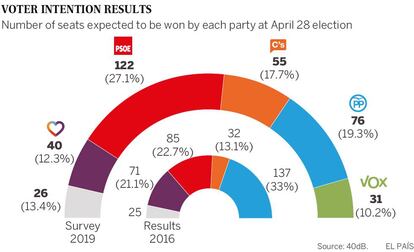Socialists set to win Spain’s snap election but fall short of majority: poll
A survey shows that the winner will have to forge alliances with regional nationalist parties in order to form a government, making a leftist bloc more likely

A voter intention poll conducted for EL PAÍS shows the Spanish Socialist Party (PSOE) clearly winning the general election of April 28, but falling well short of the absolute majority in a fragmented Congress.
According to the pollster 40dB, the party led by Prime Minister Pedro Sánchez would earn 122 seats, representing 27.1% of the vote, and would be eight percentage points ahead of the Popular Party (PP), which would have 76 representatives in the lower house.
This will be the third general election in Spain in less than three-and-a-half years. Sánchez, who has only been in power since June, was forced to call a snap election when he failed to secure enough support for his 2019 budget plan. He has been leading a minority government ever since he won a no-confidence vote against Mariano Rajoy of the PP.

Because neither one of Spain’s main parties is expected to obtain a large enough majority to form a government, the winner will need support from smaller regional nationalist parties, nearly all of which are currently in open confrontation with right-of-center groups.
The survey shows only two options for a stable executive: one is a renewed alliance of the same congressional groups that came together in the no-confidence vote last May. That initiative attracted support from the leftist Unidos Podemos alliance and from nationalist parties from the Basque Country, Valencia, the Canary Islands and Catalonia, including the separatist Catalan Republican Left (ERC) and Catalan European Democratic Party (PdeCAT).
The poll suggests that the PP, under its new leader Pablo Casado, will see the worst result since its creation in 1989
The other option is a pact between the PSOE and Ciudadanos, one of the new parties to emerge from Spain’s protracted economic crisis. But at the moment an alliance of these two groups appears unlikely. In February, Ciudadanos leaders said they would not seek any deals with Pedro Sánchez or his party after the election, in protest over the prime minister’s efforts at talks with “those who perpetrated a coup in Catalonia,” alluding to the unilateral independence declaration of late 2017.
What the poll clearly confirms is that Spain’s established two-party system is over. The system began cracking in 2015, with the emergence of the protest parties Podemos and Ciudadanos. And now there is another contender in the race: the far-right party Vox, which entered the regional parliament of Andalusia in December and now hopes to replicate this success on April 28 and on May 26, when Spain will hold local, regional and European elections.
According to this latest poll, Vox would win 10.2% of the vote at the general election, giving it 31 seats in Congress. If so, it will be the first time since the return of democracy in the late 1970s that the far right has gained such representation in Spanish politics.

Blocs
Both the left-wing bloc represented by the PSOE and Unidas Podemos (which recently changed its name from Unidos Podemos) and the right-wing bloc (PP, Ciudadanos and Vox) have 162 deputies each, 14 short of the absolute majority in the 350-seat Congress. In a similar scenario following the election, only the first bloc appears to have a chance of building the required majority with support from regional parties, most of which have already expressed rejection of the PP and any of its potential partners.
The survey, which polled 1,500 people between March 14 and 19, shows that minority regional parties would get a collective 26 seats, of which the Catalan Republican Left (ERC) seems set to earn the most, with 4.1% of the vote.
The poll suggests that the PP, under its new leader Pablo Casado, will see the worst result since its creation in 1989. The survey shows the mainstream conservatives losing 61 seats and 14 percentage points from the last election. Despite Casado’s shift to increasingly conservative positions, the PP continues to lose potential voters to Vox (18.8%) and to Ciudadanos (17.7%).
Ciudadanos would be the third-largest force in the lower house, with 55 deputies and 17.7% of the vote
The poll also shows bad news for the alliance of Podemos, United Left and the green party Equo. This group stands to lose nearly nine percentage points, with one in every five voters switching to the PSOE.
Ciudadanos would be the third-largest force in the lower house, with 55 deputies and 17.7% of the vote, a four-point rise from June 2016. The poll shows this party losing a similar amount of voters to Vox (10.6%) and to the PSOE (10%).
Asked what kind of governing alliance they would prefer to see in power, 33.9% of respondents opted for a repeat of the no-confidence motion coalition of PSOE, Unidas Podemos and the regional parties. The next favorite option is a three-way deal between the PP, Ciudadanos and Vox, mirroring the deal that ejected the socialists from power in Andalusia. This is followed by a PSOE-Ciudadanos agreement.
The turnout rate is expected to be good due to an increasingly mobilized electorate. One out of every four people who abstained in 2016 now say they are unsure who to vote for, while one of every three said they will abstain again. The abstention rate in 2016 was 30.2%.
English version by Susana Urra.
Tu suscripción se está usando en otro dispositivo
¿Quieres añadir otro usuario a tu suscripción?
Si continúas leyendo en este dispositivo, no se podrá leer en el otro.
FlechaTu suscripción se está usando en otro dispositivo y solo puedes acceder a EL PAÍS desde un dispositivo a la vez.
Si quieres compartir tu cuenta, cambia tu suscripción a la modalidad Premium, así podrás añadir otro usuario. Cada uno accederá con su propia cuenta de email, lo que os permitirá personalizar vuestra experiencia en EL PAÍS.
¿Tienes una suscripción de empresa? Accede aquí para contratar más cuentas.
En el caso de no saber quién está usando tu cuenta, te recomendamos cambiar tu contraseña aquí.
Si decides continuar compartiendo tu cuenta, este mensaje se mostrará en tu dispositivo y en el de la otra persona que está usando tu cuenta de forma indefinida, afectando a tu experiencia de lectura. Puedes consultar aquí los términos y condiciones de la suscripción digital.








































